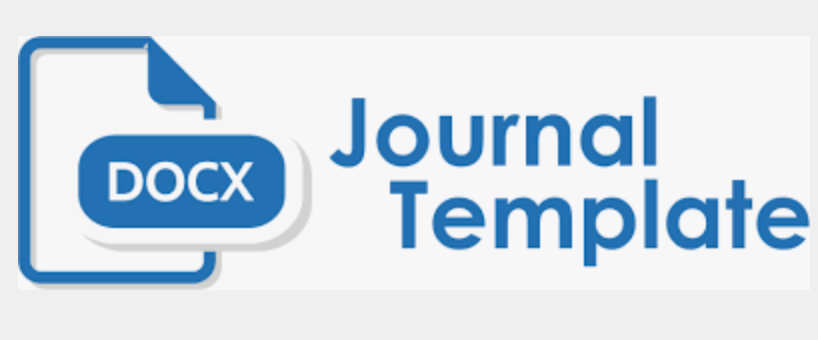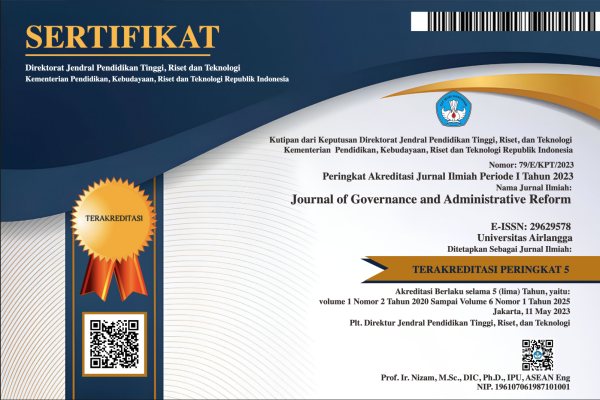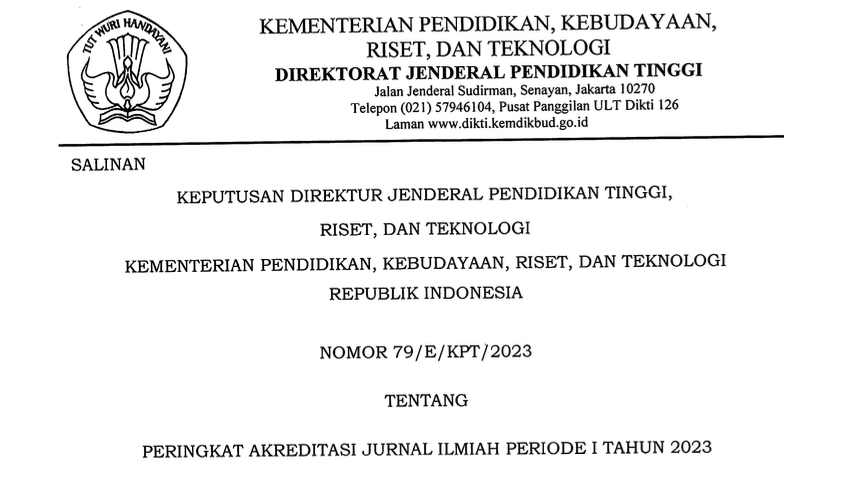Dynamism of Labour Union, Social Order and Good Governance in Nigeria
Downloads
Abstract
Nigerians have historically utilized the Nigeria Labour Congress (NLC) as a platform to challenge government policies, actions, and inactions, not only on behalf of the working class but for the broader Nigerian populace. Consequently, this study examines the collaborative efforts between Nigerian labour unions and the government in fostering social order and promoting good governance. A cross-sectional study was conducted in Nigeria's South West geopolitical zone, selected due to the region's history of industrial unrest. The research employed a quantitative methodology, utilizing a survey approach. A sample of 200 participants was drawn from the study area, with union leaders selected through purposive sampling. The selection criteria included willingness to engage, current employment status, active membership in recognized labour unions, and at least one year of involvement in union activities. The theoretical framework for this study is grounded in the concept of Governance and Social Order, which posits that societies are composed of various economic, political, cultural, religious, and professional groups. The operations of these groups are typically regulated by an institutionalized system involving the legislative, executive, and judicial branches. According to the survey, 95% of respondents believed that labour union members should participate in the policy-making process within their respective sectors. Furthermore, the study highlighted strong support for collaboration between labour unions and the government, with respondents indicating that such cooperation would enhance accountability, governance, and public trust in government activities. These findings significantly contribute to academic discussions surrounding government policy formulation and implementation.
Keywords: labour union; social order; social stability; governance; good governance.
Abstrak
Secara historis, masyarakat Nigeria telah memanfaatkan Kongres Buruh Nigeria (NLC) sebagai platform untuk mempertanyakan kebijakan, tindakan, dan kelalaian pemerintah, tidak hanya untuk kelas pekerja, tetapi juga untuk seluruh masyarakat Nigeria. Oleh karena itu, penelitian ini menganalisis upaya kolaboratif antara serikat pekerja Nigeria dan pemerintah dalam membangun tatanan sosial dan mempromosikan pemerintahan yang baik. Penelitian ini dilakukan dengan menggunakan pendekatan cross-sectional di zona geopolitik Nigeria bagian Barat Daya, yang dipilih karena sejarah ketegangan industri di wilayah tersebut. Metodologi yang digunakan dalam penelitian ini adalah kuantitatif dengan pendekatan survei. Sampel terdiri dari 200 peserta yang dipilih melalui teknik purposive sampling, dengan memilih pemimpin serikat pekerja sebagai responden. Kriteria pemilihan mencakup kesiapan untuk berpartisipasi, status pekerjaan saat ini, keanggotaan aktif dalam serikat pekerja yang diakui, dan keterlibatan setidaknya selama satu tahun dalam kegiatan serikat. Kerangka teori dalam penelitian ini berlandaskan pada konsep Tata Kelola dan Tatanan Sosial, yang mengemukakan bahwa masyarakat terdiri dari berbagai kelompok ekonomi, politik, budaya, agama, dan profesi. Operasional kelompok-kelompok ini biasanya diatur oleh sistem yang terinstitusionalisasi yang mencakup cabang legislatif, eksekutif, dan yudikatif. Berdasarkan hasil survei, 95% responden berpendapat bahwa anggota serikat pekerja seharusnya dilibatkan dalam proses pembuatan kebijakan di sektor masing-masing. Lebih lanjut, penelitian ini menunjukkan dukungan kuat terhadap kolaborasi antara serikat pekerja dan pemerintah, dengan responden menunjukkan bahwa kerja sama semacam itu dapat meningkatkan akuntabilitas, tata kelola, dan kepercayaan publik terhadap kegiatan pemerintah. Temuan ini memberikan kontribusi signifikan terhadap diskursus akademis mengenai perumusan dan pelaksanaan kebijakan pemerintah.
Kata kunci: serikat pekerja; tatanan sosial; stabilisasi sosial; tata kelola; tata kelola yang baik.
REFERENCES
Aiyede, R. (2004). United we stand: labour unions and human rights NGOs in the
democratisation process in Nigeria. Journal of Development in Practice, 14 (1/2),
-233.
Austin-Egole, I. S & Awar, V. (2023). Labour unions in Nigeria.
https://www.researchgate.net/publication/369451898
Ayodeji, G., Kolade, A., & Abiodun, E. (2023). African Union, Promotion of Democracy and
Anti-Corruption Initiatives in Africa. ABUAD Journal of Social and Management Sciences. https://doi.org/10.53982/ajsms.2023.0401.01-j.
Breetzke, G., & Hedding, D. (2018). The changing demography of academic staff at higher
education institutions (HEIs) in Nigeria. Higher Education, 76, 145-161. https://doi.org/10.1007/S10734-017-0203-4.
Brian, M. (2019). “Labour union: Meaning, objectives and benefits”.
https:/www.yourarticleclibrary.com/trade-unions/trade-union-meaning-objectives-and-benefits90560
Casale, D., & Posel, D. (2009). Unions and the gender wage gap in South Africa. Journal of
African Economies, 20, 27-59. https://doi.org/10.1093/JAE/EJQ029.
Easton, D. (1953). The political system: An inquiry into the state of political science.
New York, NY: Alfred A. Knopf.
Fashoyin, T. (2005). Industrial relations in Nigeria, 2nd Edition. Lagos: Longman.
George, O. J., Owoyemi, O., & Onokalu, U. (2018). Labour unions and unionism in Nigeria:
An historical perspective. Research in World Economy. Sciedu Press.
Kraus, J. (2007). Labour Unions and Democratization in Africa, International Journal of
Industry, 22: 255-286. https://doi.org/10.1057/9780230610033_9.
Krawczyk, K., & Sweet-Cushman, J. (2017). Understanding political participation in West
Africa: the relationship between good governance and local citizen engagement. International Review of Administrative Sciences, 83, 136–155.
https://doi.org/10.1177/0020852315619024.
Masiya, T. (2014). Social Movement Trade Unionism: Case of the Congress of South African
Trade Unions. Politikon, 41, 443 – 460.
https://doi.org/10.1080/02589346.2014.975932.
Mayanja, E. (2015). Strengthening Democratic Political Leadership and Governance for
Africa’s Development Beyond 2015: The Case of Uganda. , 229-246.
https://doi.org/10.1007/978-3-319-16166-2_15.
Nigeria Labour Congress (2009) Demand for the Review of the National Minimum Wage
and General Wage Review”, Nigeria Labour Congress, Abuja
Nigeria Labour Congress (2005), “Protests, strikes are legitmate”. Labour News, 7(13).Pp.8-9
Nwoko, K. C. (2009). Labour unionism and governance in Nigeria: A paradigm shift from
labour activism to political opposition. Information, Society and Justice. 2(2), 139-152. ISSN 1756-1078
Oikhala, G..I. (2022) Police and Governance for Sustainable Development in Nigeria,
Romania Journal of Public Affairs, Issue 5:39-68.
Oikhala & Tobi (2023) Police and Good Governance in Nigeria, Association of Nigeria
Public Administrators Journal (ANPA), 2(1) 202-212.
Oyelere. M. A. (2014). The Impact of Political Action on Labour Movement Strength: Trade
Union Revitalization in Africa. African Studies Quarterly, 16, 210.
Onyeonoru, I. P., Nwakanma, C. H. A. & Pius-Imue, B. B. (2021). The Challenge of
Managing Industrial Conflicts in Nigeria: The Union – Government Dimension. Industrial Sociology, Industrial Relations and Human Resource Management, NASA 2021. ISSN: 0331-4111. E-ISSN: 2736-075X DOI: 10.36108/NJSA/2202.02.0290
Peetz, D., Price, R., & Bailey, J. (2015). Ageing Australian Unions and the Youth Problem,
-70. https://doi.org/10.1057/9781137429537_4.
Sunmonu, H. A. (1996). Labour unionism in Nigeria: Challenge for the 21st century. A
keynote address delivered at the Conference on Labour unionism and Challenges for the 21st Century. Held at the Training and Conference Center, Ogere, Nigeria.
Tella, S. (2016). Of recession and debt accumulation. The Punch. Retrieved from
https://punchng.com/recession-debt-accumulation/
Umar, A., Usman, B. & Abdulkadir, I. (2024). The intricacies of labour management
practices in Nigeria: an inquiry into the relationships between Federal Government of Nigeria (FGN) and University Labour Unions (ASUU). FUGUS Journal of Public Administration and Management | Vol. 3, No. 1 | ISSN: 2811-1699
Yagboyaju, D.A., & Akinola, A.O. (2019). Nigerian State and the Crisis of Governance: A
Critical Exposition. SAGE Open. 1–10. DOI: 10.1177/2158244019865810
Copyright (c) 2025 Authors

This work is licensed under a Creative Commons Attribution-ShareAlike 4.0 International License.
Jurnal Governance and Administrative Reform by Unair is licensed under a Creative Commons Attribution-ShareAlike 4.0 International License.
1. The journal allows the author to hold the copyright of the article without restrictions.
2. The journal allows the author(s) to retain publishing rights without restrictions
3. The legal formal aspect of journal publication accessibility refers to Creative Commons Attribution Share-Alike (CC BY-SA).






















